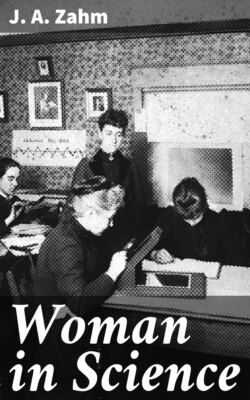Читать книгу Woman in Science - J. A. Zahm - Страница 8
На сайте Литреса книга снята с продажи.
WOMAN AND EDUCATION IN ANCIENT ROME
ОглавлениеThe condition of women in Rome, especially from 150 B.C. to 150 A.D., was quite different from what it was in Athens, even during her palmiest days. Owing to the lack of authentic documents we know but little of the history of the Roman people during the first five hundred years of their existence, but we do know that during this period many and important changes were effected regarding the social and civil status of women.
In the first place the Roman matron had much more freedom than was accorded the Greek wife during the age of Pericles. Far from being kept in oriental seclusion, like her Athenian sister, she was at liberty to receive and dine with the friends of her husband, and to appear in public whenever she desired. She went to the theater and the Forum; she took part in all reputable entertainment, whether public or private. Besides this, she had more and greater legal rights than Greek women had ever known, and was treated rather as the peer and companion of man than as his toy or his slave.
Besides this, foreign women were never so conspicuous in Rome as in Athens. Even after Greece had become a Roman province, and after Græcia capta Romam cepit—when Greek ideas and Greek customs were introduced into the capital of the Roman world—it was still the Roman matron that was supreme. And, although many Greek women, some of them of rare beauty and culture, found their way to Rome, especially under the empire, they were always kept in the background and never succeeded in achieving anything approaching the ascendancy which distinguished them during the time of Aspasia. Their influence in literature and politics was almost nil.
In the case of the women of Rome, on the contrary, it may well be questioned whether woman has ever wielded a greater influence than she did during the three centuries that followed the reign of Augustus. But she did not attain to this position of preëminence without a long and bitter struggle. Every advance toward the goal of social and intellectual equality was strenuously contested by the men, who wished to limit the activities of their wives to the spindle, the distaff and the loom and the other occupations of the household. For, as in Greece, the generally accepted view was that woman, in the language of Gibbon, "was created to please and obey. She was never supposed to have reached the age of reason or experience." And her noblest epitaph, it was averred, was couched in the following words:
